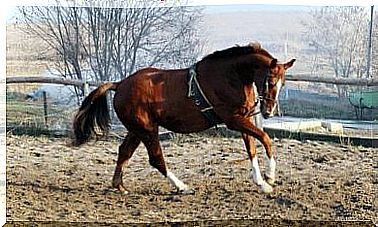The Dog Loses Weight: Possible Causes And Remedies

Weight loss in dogs is considered normal as long as it is the result of exercise or a planned dietary change. However, when your dog loses weight drastically and apparently for no reason, it could be a symptom of a serious condition.
As a general rule, weight loss in dogs is considered clinically significant when it exceeds 10% of normal body weight.
To know the latter, there are guide tables depending on the breed and age of the dog. However, the possibility of small variations in the ideal weight of the animal also due to genetic factors should not be overlooked.
Likewise, it must be taken into account that common factors such as changing seasons or stress can cause small fluctuations in the physical state of pets. These changes are generally temporary and do not represent a priori risk to health.
How to assess if your dog is losing weight
In the event of a severe reduction in body mass, it is best to take your pet to the vet as soon as possible. However, you can also make a preliminary assessment of your pet’s thinness yourself. In particular, it is necessary to check whether:
- when running your hands along your dog’s body, it is possible to feel the ribs due to the lack of an intermediate layer of fat.
- looking at the dog from above or from the side, a very pronounced curve is visible along the sides
- after weighing it, there is a significant loss of pounds in the animal compared to previous measurements.
Some of the questions good vets often ask are about appetite, difficulty swallowing, or the appearance of your pets’ feces. Sterilization or the frequency with which preventive treatment is administered to combat parasites are also among the many aspects that should be evaluated.
In general, these observations are to be integrated into a complete physical examination. Blood, urine, and stool tests are usually needed, and your vet may even find it helpful to prescribe x-rays. In fact, there can be various causes if your dog loses weight drastically.

Diseases that can cause drastic weight loss
If your dog is losing weight, he may be suffering from a chronic disease. Among the most common pathologies are:
- Gastrointestinal disorders. In these cases, weight loss is also accompanied by vomiting, diarrhea, constipation and lethargy. These symptoms cause a lack of appetite with the consequent loss of body mass.
- Chronic renal failure. In this case, the kidneys are affected and this causes weakness in the animal.
- Megaesophagus or esophageal dilation (achalasia). Dogs with this type of condition, usually large, have a swollen and enlarged esophagus, unable to pass food effectively.
- Exocrine pancreatic insufficiency (PID). When the pancreas does not produce the necessary digestive enzymes, either quantitatively or qualitatively, dogs cannot absorb all the necessary nutrients. It follows that, in addition to thinness, the animals that suffer from it show that they have a voracious appetite. The same goes for liver-related ailments.
- Diabetes. This pathology is quite common among dogs, especially in older dogs. Excessive thinness is usually associated with this disease, so much so that it is one of the symptoms that help diagnose diabetic dogs.

Unfortunately, the list of chronic diseases related to weight loss in dogs is very large. Most diseases affect both the appetite and the activity level of the animal. To prevent thinness from becoming a concern, it is good to see your vet as soon as possible. Therefore, careful evaluation is needed.
Observe your dog, monitor his behavior and try to weigh him consistently. Prevention is better than cure!









